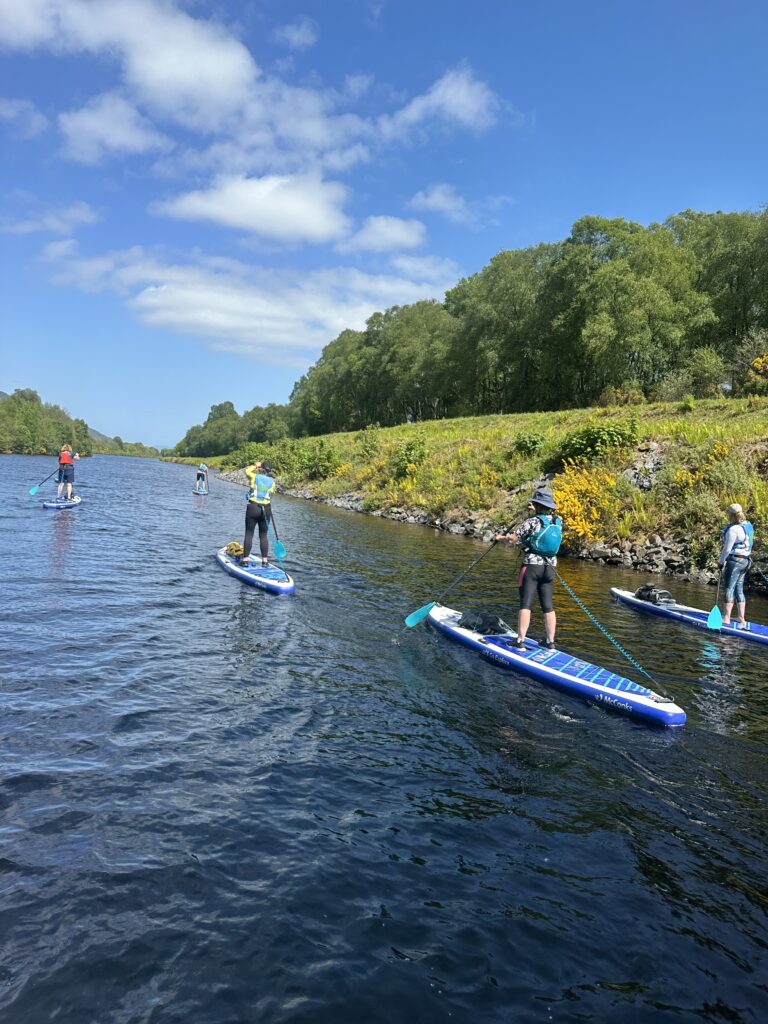In recent years, the allure of Stand Up Paddle Boarding, or SUP, has swept across the shores, rivers, and lochs/lakes of the world. Beyond being a form of exercise and a way to enjoy the great outdoors, SUP has emerged as a therapeutic tool for mental health, largely thanks to the concept of ‘Blue Space.’ But what exactly is Blue Space, and how does it intertwine with SUP and mental well-being?
Blue Space is the term used to describe natural aquatic environments such as oceans, lochs/lakes, rivers, and even urban water features. It encompasses the sight, sound, and presence of water in our surroundings. Research has shown that being near water can significantly improve mood, reduce stress levels, and enhance overall mental health.

SUP & SEA = Happy
The connection between Blue Space and mental health has deep roots in our psyche. Water is both a source of life and a calming force. The rhythmic sounds of waves lapping or a river flowing create a natural white noise, conducive to meditation and reflection. Moreover, the visual aesthetic of water – its vastness and the play of light upon its surface – has a soothing effect that can redirect our thoughts away from stress and anxiety.
SUP complements the serenity of Blue Space beautifully. It requires balance, focus, and physical engagement, which together act as a form of active mindfulness, keeping practitioners in the moment. This balance of concentration and physical exertion releases endorphins, the body’s natural stress relievers, and enhances the production of dopamine and serotonin – chemicals linked to happiness and satisfaction.
Taking up SUP also gives you access to the healing environment of Blue Space. When paddling, one is often alone with their thoughts, away from the hustle of life. This solitude enables a person to connect with nature deeply and provides an opportunity for introspection. The gentle motion of drifting on water can be likened to a form of water-based meditation, furthering the mental health benefits.
But the importance of SUP for mental wellness isn’t just in solitary practice; it also fosters community and social connection. SUP groups and events bring together individuals with similar interests, allowing for social interaction and support networks. The shared experiences of enjoyment, exploration, and sometimes even the gentle competition can lead to meaningful relationships and a sense of belonging.
To harness the full potential of SUP and Blue Space, here are some tips:
1. Start Simple: For beginners, it’s crucial to start with the basics and build confidence on the water. We always recommend a lesson rather than the friend to friend bad habit training we so often see.
2. Safety First: Always wear a life jacket or personal flotation device/ buoyancy aid and know the water conditions before heading out. Wind is your biggest enemy for SUP.
3. Embrace Nature: Take the time to simply be with the water – listen to its sounds and observe its movements. We personally love lying down on our boards and taking ten minutes of calm.
4. Be Consistent: Regularly make time for SUP to maintain its benefits for your mental and physical well-being.
5. Connect: Join local SUP clubs or companies to meet others and share in the experience.

In conclusion, the synergy between Stand Up Paddle Boarding and Blue Space offers a powerful remedy for modern mental health challenges. SUP is not merely a sport but a holistic experience that nurtures mind, body, and soul. As we continue to navigate through stressful times, embracing the paddleboard might just be the paddle we need to keep afloat in the vast ocean of life.




